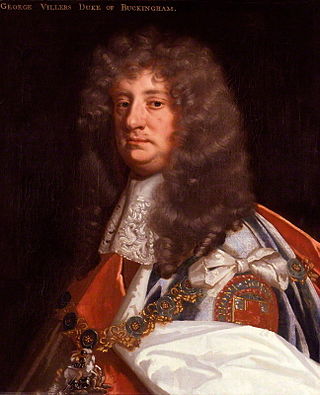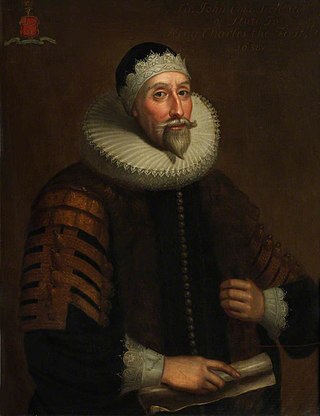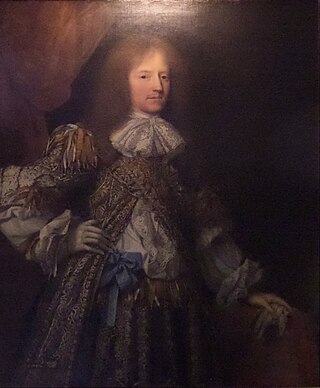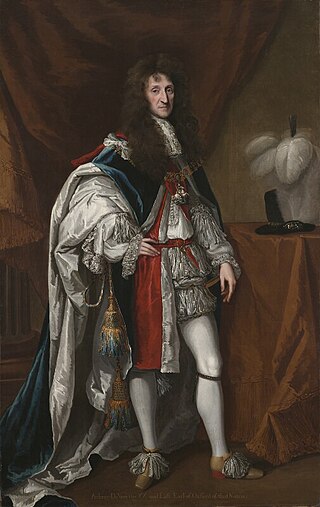Life
He was the younger son of Alexander Leighton; Robert Leighton was his elder brother. During the Wars of the Three Kingdoms he rose to be a colonel in the royalist army, was arrested in August 1647 at Kingston-on-Thames, and was imprisoned in Windsor Castle. After the execution of Charles I he joined the royalist party abroad. [1] [2]
George Villiers, 2nd Duke of Buckingham took Leighton into his service. In the autumn of 1649 Charles IV, Duke of Lorraine sent him to England, to enlist soldiers for the royal cause. He was closely examined in November of that year by the Council of State and warned that he was likely to be proceeded against as a spy. [1]
In December 1650 Charles II appointed Leighton secretary for English affairs in Scotland. After the battle of Worcester he escaped to Rotterdam with Buckingham, in October 1651. Fighting a duel with Major Nicholas Armorer in Brabant, he was sent in June 1652 by Buckingham to London with a sealed letter directed to Oliver Cromwell. The Council of State refused to listen to him, gave him back the letter, and ordered him to leave the country within a certain time; but he is also reported to have had a courteous extended interview with Cromwell. [1]
After Leighton's return to Antwerp he had a serious illness, became temporarily insane, and on his recovery turned to Roman Catholicism. In June 1656 he deserted Buckingham, on the pretext that the duke did not "rightly submit to the king". He subsequently became secretary to the Duke of York, and was knighted at Brussels in April 1659. [1]
At the Restoration of 1660, Leighton made his peace with Buckingham, and was indebted to him for preferment. He persuaded Lord Aubigny to recommend his elder brother, Robert for a bishopric in 1661. On 28 April 1664, he was made one of the secretaries of the prize office. Charles also recommended him to the University of Cambridge for the degree of LL.D. on 19 May 1665. He was appointed one of the king's counsel in the admiralty court on 15 June of that year and was admitted a civilian on 3 April 1666. [1]
Leighton was a signatory to The Several Declarations of The Company of Royal Adventurers of England Trading into Africa, a document published in 1667 which led to the expansion of the Royal Africa Company. [3] [4] Leighton continued his involvement with Royal Africa Company affairs, eventually becoming the secretary of the corporation through the influence of the Duke of York, who would become the future King James II. [5]
Leighton made an indifferent advocate, according to Samuel Pepys. When John Berkeley went to Ireland in 1670 as lord-lieutenant, he chose Leighton for his secretary. Leighton contrived to turn out of the Dublin corporation the recorder and several of the principal aldermen who were known to be opposed to Catholics. He then contrived his own appointment as Recorder of Dublin, and received a present of money from the citizens. In 1675 he accompanied Berkeley on his embassy to France, and, while arranging for the restitution of vessels captured by French privateers, took bribes on all sides. A warrant was issued for his arrest, but he managed to evade it. [1]
Leighton died in the parish of St Andrew, Holborn, on 9 January 1685, and was buried in the church of Horsted Keynes, Sussex, leaving a daughter Mary. He had a turn for mechanics, and became a Fellow of the Royal Society on 9 December 1663, but was expelled in 1677. John Evelyn went to see his project of "a cart with iron axle-trees" in September 1668. He apparently euphonised Elisha into "Ellis". [1]

Charles II was King of Scotland from 1649 until 1651 and King of England, Scotland, and Ireland from the 1660 Restoration of the monarchy until his death in 1685.

George Villiers, 2nd Duke of Buckingham, 19th Baron de Ros, was an English statesman and poet who exerted considerable political power during the reign of Charles II of England.

Henry Bennet, 1st Earl of Arlington, KG, PC was an English statesman.

Sir John Coke MP JP PC was an English civil servant and naval administrator, described by one commentator as "the Samuel Pepys of his day". He was MP for various constituencies in the House of Commons between 1621 and 1629, and served as Secretary of State under Charles I, playing a key part in government during the eleven years of Personal Rule from 1629 to 1640.

Anthony Ashley Cooper, 1st Earl of Shaftesbury PC, FRS, was an English statesman and peer. He held senior political office under both the Commonwealth of England and Charles II, serving as Chancellor of the Exchequer from 1661 to 1672 and Lord Chancellor from 1672 to 1673. During the Exclusion Crisis, Shaftesbury headed the movement to bar the Catholic heir, James II, from the royal succession, which is often seen as the origin of the Whig party. He was also a patron of the political philosopher John Locke, with whom Shaftesbury collaborated with in writing the Fundamental Constitutions of Carolina in 1669.

Henry Somerset, 1st Duke of Beaufort, KG, PC was an English politician who sat in the House of Commons at various times between 1654 and 1667, when he succeeded his father as 3rd Marquess of Worcester. He was styled Lord Herbert from 1644 until 3 April 1667. The Dukedom of Beaufort was bestowed upon him by King Charles II in 1682.

John Granville, 1st Earl of Bath PC was an English landowner who served in the Royalist army during the First English Civil War and was rewarded for his services after the 1660 Stuart Restoration with a title and various appointments.

Lieutenant-General Michael Jones, c. 1606 to 10 December 1649, was an Irish-born soldier of Welsh descent who fought for Parliament and the Commonwealth in the War of the Three Kingdoms, primarily in Ireland. Third son of Lewis Jones, Bishop of Killaloe, his brothers Henry and Ambrose were both bishops in the Protestant Church of Ireland.
Guy Carleton (1605–1685) was an Anglican clergyman. He was Dean of Carlisle from 1660 to 1671, Bishop of Bristol from 1672 to 1679 and Bishop of Chichester from 1678 to 1685.

Sir Edmund Verney was an English politician, soldier and favourite of King Charles I. At the outbreak of the English Civil War he supported the Royalist cause and was killed at the Battle of Edgehill.

Aubrey de Vere, 20th Earl of Oxford, KG, PC was an English peer and military officer who fought on the Royalist side during the English Civil War.
Events from the year 1649 in England. The Second English Civil War ends and the Third English Civil War begins.

Sir Winston Churchill, known as the Cavalier Colonel, was an English soldier, historian, and politician. He was the father of John Churchill, 1st Duke of Marlborough and a direct ancestor and namesake of Sir Winston Churchill, who served as British prime minister in the 20th century during the Second World War.

Sir Edward Villiers was an English Royalist soldier and courtier. Part of the powerful Villiers family, he was a friend of Edward Hyde, chief advisor to Charles I and Charles II from 1641 to 1668.
The Recorder of Dublin was a judicial office holder in pre-Independence Ireland.
Edward Walsingham was an English royalist author, known for his verse of the First English Civil War and Arcana Aulica, often wrongly attributed to Sir Francis Walsingham.
Matthew Wren was an English politician and writer. He is now known as an opponent of James Harrington, and a monarchist who made qualified use of the ideas of Thomas Hobbes.

George Fleetwood (1623–1672) was an English major-general and one of the regicides of King Charles I of England.
Sir Robert Peake (c.1607–1667) was an English print-seller and royalist. He published a number of engravings by William Faithorne.
Sir James Donnellan was an Irish lawyer and politician, who became Chief Justice of the Irish Common Pleas in 1660. He was unusual among the Irish judges of the time in being of Gaelic descent, and more remarkable in that his service as a judge under Oliver Cromwell did not disqualify him from service after the Restoration of Charles II.
![]() This article incorporates text from a publication now in the public domain : Lee, Sidney, ed. (1893). "Leighton, Elisha". Dictionary of National Biography . Vol. 33. London: Smith, Elder & Co.
This article incorporates text from a publication now in the public domain : Lee, Sidney, ed. (1893). "Leighton, Elisha". Dictionary of National Biography . Vol. 33. London: Smith, Elder & Co.











